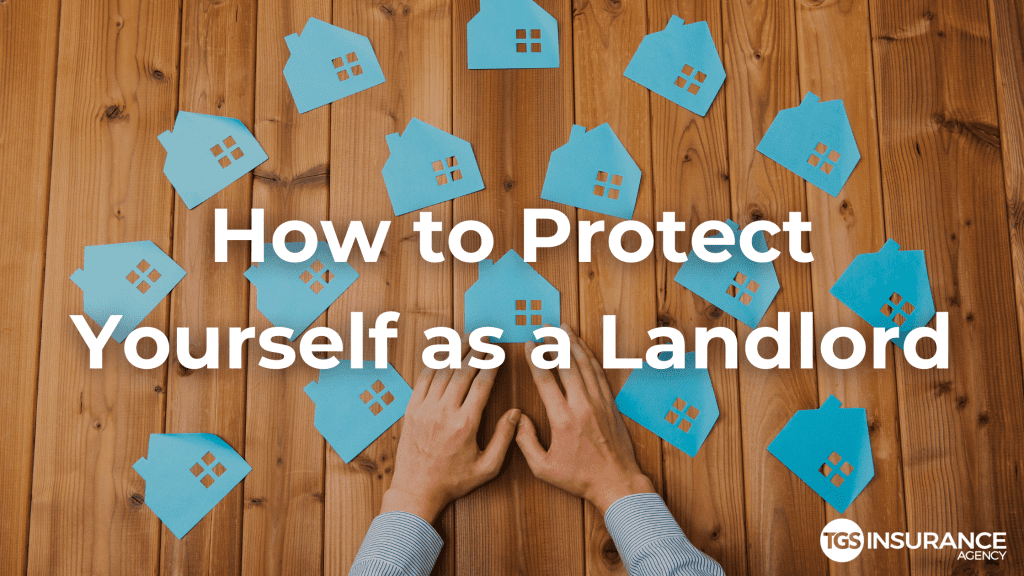
Owning a rental property is no easy feat and can be pretty risky- especially if the groundwork hasn’t been laid from the beginning. As a landlord, you always want your properties to be safe and secure to protect your investment. Let’s review what you can do to mitigate any risks and protect yourself as a landlord.
Get Everything in Writing
Always get everything in print! Your lease agreements should always strictly dictate your policies about late rent, pets, noise complaints, subletting, etc. When it comes to communication, getting everything in writing is critical. Should there ever be a dispute or legal action, keeping detailed records of any emails or texts, receipts, repairs, maintenance notices, etc., will help keep yourself as the landlord protected.
Take Before and After Photos
Be sure to always take before photos before a new tenant moves in and after pictures when they move out. Normal wear and tear are expected, but damages that their deposit wouldn’t cover that’s something you’ll want to document in case you need to charge your tenant for repairs or replacements. Documentation is essential should you get in a legal dispute, and photographs or videos are the best evidence.
Clearly State Lease Violations
Your lease should always strictly state what constitutes as a violation and what happens when those terms are violated, including but not limited to late rent, undocumented pets, policy violations, etc. Any resolutions to the tenant’s infractions should be clearly outlined, such as warnings, fines, or eviction.
Any Fees or Deposit Requirements Should Be Specific
Paying a security, damage, or pet deposit is common when renting a home, and the name of the deposit usually dictates what those funds can be used for. Security deposits are used to secure the payment of rent and utilities, but that deposit can also be used to repair damage if your rental agreement clearly states it. If you have a damage deposit, those funds can be used to repair or replace damaged things beyond reasonable wear and tear. If you allow pets and have a pet deposit, the funds can be allocated to fix any damage caused by the tenant’s pet, such as broken blinds, carpet cleaning, or yard damage.
Screen Your Tenants
As a landlord, you can save yourself a lot of headaches by meticulously screening your tenants before handing the keys over. You should always:
- Pull credit reports
- Order a background check
- Talk with current and/or past landlords
- Talk with current employer
- Have a detailed application and fair security deposit
It might seem like a bit much, but knowing who you’re renting to beforehand, will help you weed out any bad tenants and only rent to good ones.
Get Good Landlord Insurance
The single best way to protect yourself as a landlord is to have landlord insurance. Landlord insurance is an insurance policy that protects the property owner from any financial losses incurred from owned rental properties. Landlord insurance is broken down into two essential pieces: property and liability protection.
- Property protection: This protection helps cover any physical property related to the home, including the dwelling itself and any equipment needed to maintain your property.
- Liability protection: This portion pays for any medical bills or legal expenses if someone is injured on your property that you’re legally liable for.
Landlord insurance does not protect your tenant’s possessions; therefore, tenants will need to purchase a renters insurance policy. As a landlord, you can require your renters to have a renters insurance policy as part of their lease agreement.
Landlord insurance is not mandatory, but it’s wise for any property owner to protect their financial assets and properties. The easiest way to shop for a landlord policy is to compare multiple providers for the best deal and coverage, though this can be time-consuming. But we can help! Talk to a TGS Insurance agent today, and we’ll shop your landlord policy across our bank of A-rated (or better) carriers to find you a policy that’s perfectly crafted to protect you and your financial investments.
TGSI Tip: Consider purchasing an umbrella policy for an extra financial safety net. Depending on how much coverage you want, an umbrella policy can cost anywhere between $150-$300 per year.
Surround Yourself With a Good Team
Hiring a team of people you can trust to help manage your properties will help eliminate stress and keep your business streamlined and running smoothly. You’ll want to hire:
- Property Manager
- Licensed contractor
- Real estate attorney
- Insurance broker (TGS Insurance!)
- CPA or bookkeeper
- Banker/lender
Set Up a Good Record-Keeping Process
Anyone getting into real estate knows that you need to abide by many financial and legal rules if you’re going to be a landlord. Good record-keeping will help you properly file and organize all your essential documents. A good tip is to put documents in the cloud in case of a natural disaster or computer crash so you don’t lose anything important.
Trust TGS Insurance With All Your Insurance Needs
At TGS Insurance, we can help protect you as a landlord with all of your insurance needs. Managing properties is hard enough; let us take some of the work off your plate by taking care of all of your insurance policies, renewals, and any updates to coverage- we handle it all! Talk to a TGS Insurance agent today and get a hassle-free quote for all of your properties.
Sources:
Instant Home Insurance Quote
Recent Home Insurance Articles:
- Does Home Insurance Cover Vacation Rentals? Here’s What You Need to Know
- Home Insurance Coverage Gaps You Might Not Know Exist—Until It’s Too Late
- Grilling Safety Tips for a Secure Memorial Day BBQ
- How to Change Home Insurance with Escrow: A Step-by-Step Guide
- Pool Safety Tips for Homeowners: Stay Cool and Covered This Summer